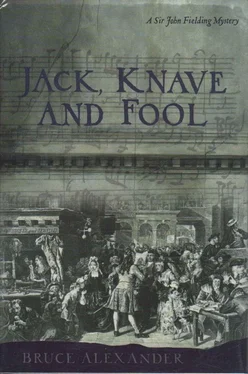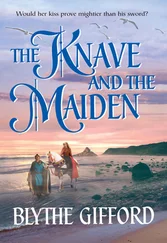Bruce Alexander - Jack, Knave and Fool
Здесь есть возможность читать онлайн «Bruce Alexander - Jack, Knave and Fool» весь текст электронной книги совершенно бесплатно (целиком полную версию без сокращений). В некоторых случаях можно слушать аудио, скачать через торрент в формате fb2 и присутствует краткое содержание. Год выпуска: 1999, ISBN: 1999, Жанр: Исторические приключения, на английском языке. Описание произведения, (предисловие) а так же отзывы посетителей доступны на портале библиотеки ЛибКат.
- Название:Jack, Knave and Fool
- Автор:
- Жанр:
- Год:1999
- ISBN:9780786217984
- Рейтинг книги:4 / 5. Голосов: 1
-
Избранное:Добавить в избранное
- Отзывы:
-
Ваша оценка:
- 80
- 1
- 2
- 3
- 4
- 5
Jack, Knave and Fool: краткое содержание, описание и аннотация
Предлагаем к чтению аннотацию, описание, краткое содержание или предисловие (зависит от того, что написал сам автор книги «Jack, Knave and Fool»). Если вы не нашли необходимую информацию о книге — напишите в комментариях, мы постараемся отыскать её.
Jack, Knave and Fool — читать онлайн бесплатно полную книгу (весь текст) целиком
Ниже представлен текст книги, разбитый по страницам. Система сохранения места последней прочитанной страницы, позволяет с удобством читать онлайн бесплатно книгу «Jack, Knave and Fool», без необходимости каждый раз заново искать на чём Вы остановились. Поставьте закладку, и сможете в любой момент перейти на страницу, на которой закончили чтение.
Интервал:
Закладка:
Lord Laningham would then speak his piece before the music could begin. Yet it was brief. “Dear friends of ancient music, we have a fine program for you this evening, we do, and all of it by our favorite, Mr. Handel, may the good Lord keep his soul. Well, there’s the Ode for St. Cecilia j Day, of course, but that’s a bit later.” He stopped a moment, hemmed and hawed, then turned and sought the aid of the musicians. “Ah yes, we begin with two of Mr. Handel’s grand concertos, the first two, I’m told, of… what is it now?” Again he turned to the orchestra. Then: “Of Opus three, I’m told. Mr. Concertmaster?”
With that, Lord Laningham withdrew to a chair of honor placed before the orchestra and facing out toward the audience. He seated himself but kept in hand that staff with which he had ascended to the stage; it was gilt-painted and had at its upper end a round bulb of good size, such as would fill a man’s hand.
The concertmaster, which is to say the violin player nearest us, stood, taking the attention of the musicians, and began them on the first piece of the program. Remarkable it was how all managed to start together under his direction; once they were playing, however, he seated himself and played as one of the many. Indeed there were many — thirty-three, as I counted them-divided between strings and horns of every sort, with stringed instruments somewhat in the majority. Remembering Annie’s objection to the loudness of the music, I admitted that while that was true, there was a certain grandeur in that greatness of sound. I liked the way it changed from loud to soft and back to loud again; thus also with the pace of the music, going for a stretch at a dignified, funereal gait, then unexpectedly breaking into the swift movement of some dance, a jig or an allemande.
Lord Laningham himself had a great preference for these sprightly parts. When they came, he was moved to jump from his chair and begin beating his staff upon the stage floor in time to the music — though not, alas, in strict time. I noted that often the musicians would look up at him in annoyance as he banged and capered about. Yet he, it seemed, was having a grand time oi it; so completely did he give himself to his performance before the orchestra that in the space of two concerti grossi (which may have taken hall an hour to perform) he had quite exhausted himself. Beckoning a server to him, he gave quite detailed instructions to the fellow and then pointed back to the table whence he, Lord Laningham, had come. In a moment the server had returned with a newly opened bottle of wine and a glass. The lord did wave away the glass but took firm hold of the bottle and took a deep swig from it. With his thirst temporarily slaked, he sat and rested as the choir began to file in.
There was a space often minutes, perhaps as many as fifteen, between the first and second parts of the program. (I later learned that there was a third part planned, selections from the Water Miuic, always a great favorite with attendants of the concerts.) During this time musicians left their chairs and milled about. A few left the stage altogether, perhaps answering calls of nature. The choirmaster conferred with members of the choir who had grouped around him. Annie, a bit shorter than most, was near invisible in the crowd. Through it all, Lord Laningham sat, fortifying himself from time to time with a swig from the bottle.
As we waited, Mr. Alfred Humber regaled us with tales of the patron’s past foolishness: how he did, on one occasion, become so carried away with the pomp of the Royal Fireworks Music that he descended the stairs from the stage and led a parade through the audience; and on another, wishing to show his appreciation to the orchestra for what he judged a superlative performance of something or other (and lacking a hat), he doffed his wig to them, revealing a head quite bald except for a bit of fuzz at the ears.
“He is such an embarrassment,” said Mr. Humber. “Some come just to laugh at him. I don’t know why the Academy puts up with the old fellow-though I suppose they must. It’s all that wine he drinks, I suppose.”
All the members of the orchestra had reassembled and were back in their chairs. The choir had taken its place on a platform to the left of the musicians, with the sopranos, Annie among them, at the far end.
I half expected Lord Laningham to make some sort of announcement — but no, he remained seated. He seemed subdued somewhat, yet bothered, shifting frequently and, it seemed, somewhat uncomfortably in his chair of honor.
Perhaps he was merely bestirring his old bones, limbering them up to perform, for sure enough, once choir and orchestra had begun he was up on his feet, no doubt inspired by the booming sound of the great kettledrums. Yet this time he did no more than beat his staff upon the floor. He wandered about a bit uncertainly; then he found his way over to the choir, where he did ogle the sopranos — pretty Annie, it seemed, in particular. The choirmaster was openly annoyed by this.
I cannot, by the bye, say that I actually heard our Annie singing on that occasion. Certainly I heard the choir, and she was one of them. Her lips moved, and her mouth opened. I watched her closely until Lord Laningham drew near to her, at which time she put her music up before her and hid behind it.
Still he wandered, yet with faltering step. The ceremonial staff he simply dragged after him, bringing it down only now and then upon the floor. He had paled. Sweat stood upon his face. A murmur of comment at his condition went through the crowd as he found his way back to his chair and collapsed into it. He dropped his staff, and it rolled a few feet from him across the stage. Then did he lean forward as if to retrieve it. Having so leaned, he could somehow not stop himself, and quite out of control, he toppled lengthwise upon the floor. His lower body quivered and jerked, knocking down the chair from which he had fallen and sending the half-consumed bottle of wine spinning across the floor, spilling its contents. Then, in what may have been his last willed act, he raised his head — but only to vomit. Beef, bits of pudding, and a good deal of nasty red liquid, which I took to be wine, spewed forth from his gaping mouth. It was a most unpleasant sight to behold.
For a moment there was silence. The orchestra had halted, and so, too, the choir. Those in the audience were too stunned to do more than gawk. Yet only for a single eye-blink of a moment did that silence last, for in the next instant all onstage seemed to be converging upon the fallen figure. There were shouts and screams from them, as from the great crowd in the ballroom. Of a sudden all was chaos.
“What a disgrace!” shouted Mr. Humber. “He’s fallen drunk and vomited out his guts before us. This certainly exceeds the limit.”
There were others all around who joined him in similar cries of disgust.
Mr. Donnelly, however, already on his feet, put a different interpretation upon those actions all had witnessed. “Dear God,” said he, “the man is ill. I must do what I can to help him.” And so saying, he left us at the table and ran to the steps nearby leading up to the stage. I saw him pressing through the crowd that suddenly surrounded Lord Laningham.
There was shouting:
“Give him room!”
“Do not push so! You’ll crush my violin.”
Then just as Mr. Donnelly reached the figure on the floor of the stage and knelt down to him, I felt a tug at my sleeve. It was Sir John, who had come round the table to seek me out special.
“Jeremy,” said he to me in a hoarse whisper, “you’ve a good pair of eyes and mind enough to note peculiarities. Tell me quickly, boy, exactly what you saw from the time Lord Laningham appeared on the stage.”
That I did in no more than a minute’s time. Sir John listened, concentrating carefully on what I had to say. He nodded when I finished.
Читать дальшеИнтервал:
Закладка:
Похожие книги на «Jack, Knave and Fool»
Представляем Вашему вниманию похожие книги на «Jack, Knave and Fool» списком для выбора. Мы отобрали схожую по названию и смыслу литературу в надежде предоставить читателям больше вариантов отыскать новые, интересные, ещё непрочитанные произведения.
Обсуждение, отзывы о книге «Jack, Knave and Fool» и просто собственные мнения читателей. Оставьте ваши комментарии, напишите, что Вы думаете о произведении, его смысле или главных героях. Укажите что конкретно понравилось, а что нет, и почему Вы так считаете.












